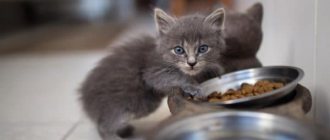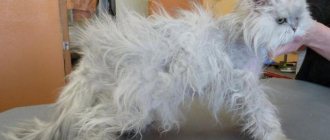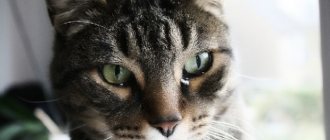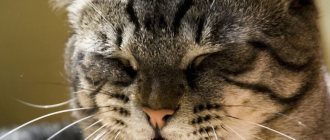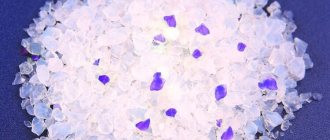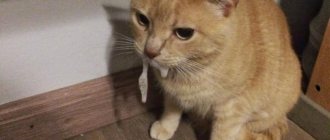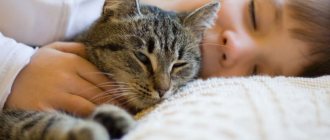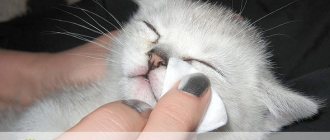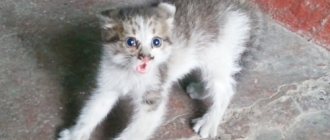11819Pavel
2
There are many myths about cats. There are no less misconceptions about their health. Even experienced owners do not always know what the cat’s condition and the temperature of individual parts of its body should normally be. It is believed that the nose should be wet and cool. And if a cat has a hot nose, it means he is sick and needs help. Unfortunately, the pet cannot tell us how it is feeling. A cat's nose can be an excellent indicator of changes in health.
What should a healthy cat's nose look like?
Veterinarians are sure: a healthy cat’s nose is cool and moisturized, because he endlessly licks it, and the body secretes a special secretion that prevents the nasal sinuses from drying out.
There are times when the animal is not sick, but its nose is warm and dry.
- The pet was in the open sun for a long time.
- The air in the room is very dry or the cat has been sitting next to the radiator for a long time.
- The animal is sleeping or has recently woken up.
- The cat had been active in the last few minutes, his body temperature had increased and his nose had become dry.
- The animal mainly leads a passive lifestyle.
- The pet was very frightened by something and was under great stress.
The above reasons are not dangerous to the life and health of the pet, so there is no need to worry. You need to worry if the cat is usually energetic and cheerful, but suddenly becomes lethargic and passive.
The cat has a dry and warm nose: what to do at home?
If your cat feels fine and nothing serious has happened to him, you can help your pet yourself. We offer you special measures that will be useful to you if your cat has a dry and warm nose.
- The cat's nose is dry and dirty. If you don’t clean your cat’s nose, it can become dirty, after which it will be difficult for the pet to breathe and the physiological lubrication of the nose will decrease. As a result, thermoregulation will be disrupted and the nose will be hot.
- Carefully clean the dirty spout from the outside and inside. Be careful not to damage sensitive tissue. After approximately 20 min. you will notice that your cat's condition returns to normal.
- Burn from strong sun rays. Every cat loves to sleep in the sun. But prolonged sleep under strong rays of the sun does not bring any benefit. Situations with burns are much more common than expected. This is especially true for those individuals who have a delicate pink nose.
- In a cat that has received a sunburn, the nose becomes red, hot, and the pet feels pain at the slightest touch. Over time, the skin on the nose becomes rougher, it becomes dry and rough. In this case, treat the cat’s nose with an anti-burn drug that has moisturizing and anti-inflammatory properties. Apply the product carefully so that it does not penetrate the nostrils. Repeat the procedure again until the nose looks normal.
Treat your nose
- Allergic reaction to chemicals. Many pets can have allergies. Don't forget about this when cleaning the house. If you do not wash the product well, it can cause great harm to the cat, who likes to poke his own nose into every corner.
- Urgently carry out another wet cleaning. Wash all surfaces thoroughly with clean water. Wash away any remaining chemicals that may cause irritation or allergies in your cat. Also does not include consultation with a veterinarian. He will tell you which antihistamine can be given to your pet and in what dose.
Lethargic pet
INTERESTING! A dangerous symptom of a dry nose and hot ears is the animal’s inactivity, the pet sleeps a lot, and lack of appetite.
Dilated pupils in a pet along with an increase in temperature are a serious signal of illness. This disease may cause symptoms such as vomiting, diarrhea, hair loss, and animal anxiety. If your pet is lethargic:
- Provide the cat with a dry and warm place.
- Heat the milk and give your pet a drink.
- It is recommended to massage the animal's abdomen and stroke it all over the body, this is required for better blood flow in the superficial skin vessels.
- It is necessary to check the pet's pulse; when the animal is over, the pulse will be rapid. The animal may also sneeze, breathe deeply, and possibly cough.
Why might a cat have a hot and dry nose?
The normal temperature of domestic cats is 38-39° C, so owners often think that their pets have a dry, hot nose. If the sinuses remain excessively hot and dry for a long time, you need to take a closer look at the animal.
Be sure to read: The cat eats poorly and is losing weight: causes, safe and dangerous symptoms, first aid, treatment The cat may be suffering from dehydration or has a fever.
Additional signs indicating the disease:
- loss of appetite;
- hot ears;
- apathy;
- loss of activity;
- sneezing;
- frequent pulsation;
- sleeping too long;
- frequent visits to the toilet;
- causeless anxiety;
- vomit;
- atypical nasal discharge;
- loose stools mixed with blood, etc.
The cat must be urgently taken to the veterinarian or called to your home. Do not self-medicate - you may make the situation worse.
Attention! Many inexperienced breeders recommend giving their pets Paracetamol to reduce fever. This cannot be done - the drug is toxic to felines and can be fatal!
Additional symptoms, their explanation and what the owner should do
As we just said, a dry nose alone does not indicate much. Therefore, we list additional symptoms and their explanation. And we’ll also tell you what the breeder should do when they appear.
Nose is very hot
If the nose is very hot (so much so that the hand feels it immediately), and the kitten itself looks “smeared,” things are bad. With almost 100% probability, the baby has an extremely elevated general body temperature, and he must be shown to the veterinarian immediately. This often happens in kittens with viral infections, and they are deadly for young animals. Here's what you can do:
- Place the kitten in a well-ventilated room (but without drafts), the air temperature should be within 20°C.
- Give the animal plenty of drink, to which you can add a little sugar.
- Call a veterinarian.
There is no need to give any “human” antipyretics! For example, any paracetamol-based products are lethal for cats.
Nose is very cold
If the nose is very cold and dry, then this is also not very good. This can happen when:
- Very severe intoxication of any origin.
- For sepsis.
- In the terminal stages of many infectious diseases.
- With intermittent fever, when the body temperature “swings”, with a sharp increase and decrease.
In all these cases, not only the nose is cold, but the whole body. Often, such a sharp drop in temperature indicates a complete failure of the thermoregulation center in the brain. It often precedes the death of the animal. It is necessary to place the animal in a warm place (but not in the heat) and urgently call a veterinarian. It is unlikely that you will be able to do anything on your own.
Dry nose while sleeping
As we have said many times, a dry nose during sleep is completely normal, there is no need to panic. If it comes to a city apartment or other housing with central heating, it is worth checking the air humidity in the room.
If it is too low, we advise you to purchase an air humidifier or simply start an aquarium.
Kitten sneezes
If a kitten sneezes and has a completely dry nose, the symptom may indicate:
- Infectious diseases of the upper respiratory tract. As a rule, mucus or some kind of exudate is released from the nasal passages.
- This happens when the room is dusty and stuffy.
- Possible allergies.
- Sometimes this indicates the presence of foreign bodies. In this case, mucus may be released abundantly from the nose, and it often contains blood impurities.
When is a dry nose a sign of illness?
A dry cat's nose is often a sign of illness. One of the reasons is a stomach clogged with hairballs. Buy special food for hair removal at the pet store.
Collecting seeds in a tray will also help: just fill the tray with water according to the instructions, and in a few days your pet will be enjoying the young grass. With the grass, the fur accumulated in the stomach comes out of the animal’s body.
Owners often complain that their cat eats too much. Her body cannot cope with large doses of food, which leads to a malfunction in the digestive system and is manifested by dry sinuses. It's easy to combat overeating - put in a bowl as much food as she can eat during the day.
In addition to the nose, the ears are a clear indicator of a pet’s health. If they are hot and pink on the inside, this is a sign of illness. Take the animal to a veterinarian. Observe your pet - poor appetite and apathy towards toys also indicate illness. Call the doctor!
Dry nose even when awake
In such cases, it is only necessary to observe the pet to see if its cat energy (activity) or appetite have changed. If a cat sleeps for a long time, does not show physical activity, and has a poor appetite, this means that the pet is sick. Only in this case, a dry nose is an indicator that the animal is sick.
A cat's nose is not wet, perhaps due to minor abnormalities in the body . An example of this would be overeating, undereating, or a stomach clogged with fur. Such minor ailments will go away on their own within a week .
The kitten has a dry and warm nose: what to do?
- The body of a small kitten is very similar to that of a child. He also has a high metabolism. A pet's nose can react to various changes much faster than that of an adult cat.
- And thermoregulation at a young age is still unstable; it has not yet fully formed.
- During the course of a day, your kitten’s nose may become cold, then hot, dry, or wet several times.
This may depend on all sorts of factors:
- The kitten just woke up.
- The pet started playing.
- The baby has recently eaten.
In a kitten The condition of the nose may also depend on what mood the kitten is in.
- Such changes are considered natural, so you should not worry about such an event. But, if the animal shows alarming signs (the mood, behavior has changed, the kitten has become less active), it is necessary to sound the alarm.
- Kittens have dry and warm noses unless their mother licks them thoroughly. The kids themselves cannot do this on their own. In such a situation, help the growing animal. Wipe the kitten's face with warm water several times a day, but it must be boiled.
- The condition of a small kitten's nose can tell you a lot. But his risk of getting sick is much greater if you have not yet had time to vaccinate him. In addition, a dry, hot nose may indicate that the pet has been poisoned. In this case, go to the vet immediately.
Watch the nose Try to pay close attention to such physiological changes in cats. As a rule, they do not signal any serious illness. But there are cases that a dry nose is only the first symptom of a serious illness, and therefore you cannot do without the help of a veterinarian.
Rabies in cats
Rabies (hydrophobia) is a deadly viral zoonotic disease of domestic and wild animals. The disease is provoked by a specific neurotropic virus from the rhabdovirus family, which penetrates through nerve fibers into the spinal cord, brain, and salivary glands of animals.
In this disease, which inevitably ends in the death of animals, the central nervous system is affected. Hydrophobia is a zoonotic disease, that is, common to animals and humans.
The carriers of infection are predators and wild carnivores. Infection of cats occurs directly through a bite when the integrity of the epidermis and mucous membranes are damaged. The virus multiplies in the salivary glands of infected individuals.
Rabies is noted in cats of various age groups and breeds. The infection occurs acutely, subacutely, and less often – chronically. Symptoms of infection increase gradually. The intensity of clinical manifestations depends on age, immune potential, virulence, concentration of the virus in the animal’s body, as well as the location of the bite.
Important! Before the first symptoms characteristic of hydrophobia appear, the rhabdovirus is contained in the saliva of infected individuals, which are hidden virus carriers. An apparently healthy pet can infect humans and other animals.
The risk group includes small kittens with a fragile immune system, animals weakened by viral and bacterial diseases, as well as unvaccinated cats. Therefore, if you care about the life of your pets, do not neglect vaccinations.
What to do if your cat has a dry nose?
Hyperthermia is the main ailment in cats, leading to a dry nose. Observe your pet for 2-3 hours: how and how much she eats, whether she goes to the toilet, whether she is playful or apathetic, etc.
Be sure to read:
A cat eats poorly: normal or pathological, reasons, first aid, what to do, how to get it to eat
If the animal's lethargy does not go away, contact your veterinarian. Also, do not delay a visit to the doctor if the cat does not allow you to touch its stomach, breaks out, scratches, or yellow-green bubbles are periodically visible from its nose.
You can make your cat feel a little better by periodically applying something cool to her armpits and groin area. Also wet your pet's fur - this will slightly lower the body temperature. Do not diagnose your cat - this can only be done by a specialist.
Wait for the doctor, and while he is on his way to you, stay close to your pet. Talk kindly, stroke her head - she needs support.
What symptoms should you start to worry about and what should you do?
You can determine that a cat has certain health problems based on the following signs:
- Deterioration of appetite – occurs with a general weakening of the body.
- Activity is reduced, mobility has dropped to zero - the cat constantly sleeps, refuses to play, and does not respond to the call of its owners.
- Signs of a cold appear - just like in humans, these are sneezing, redness of the eyes, and runny nose.
- Increased salivation.
- Excessive hair loss, including uneven hair loss (clumps).
- Bloody or purulent discharge in the urine and stool.
- Significant increase in body temperature.
If one or more of these factors is present, it is worth conducting a general examination of the animal at home. If alarming signs are detected, immediately visit a veterinarian.
Causes
Fortunately, if a cat's nose is warm and dry, this does not mean that he is sick. It may seem to a person that a cat has a dry and hot nose, since a cat's body temperature is as much as 2 degrees higher than the body temperature of a healthy person, and this difference is very noticeable.
After active play with the body, heat evaporates (this process is well known to athletes - during training they sweat a lot and warm up). Consequently, when a cat has had a fair amount of play and is in an alert state, her nose may feel wet and hot, but just 10 minutes later it may feel wet and cold.
However, such temperature fluctuations are not yet a signal of the development of diseases. In this case, the cat’s nose only conveys the normal, absolutely natural processes of changes in the animal’s body temperature, depending on its physical activity.
Should I worry?
In fact, cats are such vulnerable and delicate creatures that many everyday factors can provoke a short-term increase in temperature or cause their nose to warm up. Answers to the question “why does a cat have a hot nose?” there may be several:
- the pet is sleeping or has just woken up, and after it has warmed up in its sleep, its temperature is slightly elevated;
- the cat experienced stress (the appearance of another pet in the house, moving to a new place, someone loudly shouted at him);
- the animal was scared of something (loud noise, barking dog, vacuum cleaner, etc.);
- the furry friend showed too much activity, played, jumped, etc.
If your pet not only has a warm, dry nose, but also a high fever
Usually they don’t bring down the slightly elevated level and allow the body to fight the infection. But if the temperature is very high, then, of course, the animal needs help. How to help your pet? The recommendations in this case are as follows:
- the animal's fur must be wetted periodically;
- There should always be a bowl of cool water next to the pet so that the kitten can drink at any time;
- You can also place an ice pack under the animal’s neck or thighs (on the inside).
If we talk about products that reduce fever, then it is not advisable to give them to a kitten. It’s better to call a veterinarian who will examine your pet and tell you what to do and how exactly.
In what cases should you immediately contact the clinic?
As you can see, a dry, warm nose in kittens is not always a cause for concern. If your dry nose is caused by physiological (natural) reasons, do not worry. Let's consider in what cases you need to immediately contact the clinic.
Alarming symptoms:
- vomiting, nausea, profuse diarrhea, unstable stool;
- refusal of feed, food, water, weight loss;
- the presence of foreign impurities in feces and vomit (blood clots, threads, inclusions, mucus);
- hyper-hypothermia;
- allergic manifestations (skin rash);
- inadequate response to stimuli;
- a sharp change in behavior (anxiety, apathy, severe depression);
- mucous, purulent, catarrhal discharge from the nose, eyes;
- dull fur;
- presence of hairless areas on the body;
- lack of coordination;
- muscle spasms, cramps, tremors;
- difficulty breathing, wheezing, wheezing when breathing, shortness of breath;
- sneezing, attacks of wet, dry cough;
- frequent or, conversely, difficulty urinating;
- rapid pulse, irregular heartbeat (arrhythmia, tachycardia, bradycardia).
What to do in case of a post-vaccination reaction
In case of allergic reactions in cats, antihistamines (Diphenhydramine, Tavegil, Suprostin) are prescribed in tablets, injections, and homeopathic remedies. The dosage is calculated taking into account the body weight of the animals. If necessary, detoxification therapy . The animals are given IVs and saline solutions are injected intravenously.
Edema, swelling at the injection sites, and lameness usually resolve spontaneously after a few days or weeks. If a hematoma, abscess, or sarcoma forms, or if the cat is limping severely, show the cat to a veterinarian. Special surgical procedures may be required.
If the digestive processes are disturbed, in case of diarrhea, keep the cat on a semi-starved diet for 12-20 hours. The pet must have free access to drinking water. You can give your cat rice water, herbal teas (chamomile, St. John's wort, oak bark), enzyme agents, probiotics, medicinal food. Until the cat’s condition is completely normalized, the cat’s diet should consist of easily digestible food.
If the general temperature is elevated after vaccination, give the cat antipyretic medications, general tonic drugs, and homeopathic remedies.
In the first week after vaccination, monitor the behavior and health of the cat. If a tendency to deterioration is noticed, convulsions and epileptic seizures periodically appear, the animal weakens, refuses food, looks depressed, immediately contact a veterinarian and take the cat to a veterinary hospital. The veterinarian will relieve side symptoms, prescribe therapeutic therapy to normalize the condition, as well as another veterinary drug for vaccination.
Symptoms of pathology and diagnostic methods
During the day, the nose constantly changes from dry to wet and vice versa, this is considered the norm, because everything depends on the lifestyle and mobility of the animal. You also need to know that the temperature of a cat’s nose is 2 °C higher than that of a human, so it may seem that the cat’s nose is hot, but it is not. When there is lethargy throughout the day and a constantly elevated temperature, above 39.5 °C, it is worth taking your pet to a veterinarian and taking a blood test to determine the infection.
A consultation will be needed if the cat's nose color has changed. There are cat breeds whose earlobe color changes depending on the season, and older animals may develop pigmentation. When the nose becomes dry and cracks, this is dry nose syndrome, which affects cats of the Bengal breed. If your pet has a cold, chills, poisoning, shock, a cold and dry nose will be observed. Yellow indicates liver or kidney disease, and an inflamed red organ of smell is a sign of:
- rhinitis;
- infections;
- mechanical irritation;
- high blood pressure;
- high temperature;
- allergies.
If the olfactory organ is hot, you need to contact a specialist who will conduct an examination and identify the cause of the disease. When a cat has a hot nose for a long time, it is necessary to analyze the clinical picture as a whole. The doctor will conduct a comprehensive examination, measure the temperature, take the necessary blood tests, perform an ultrasound if necessary, and then prescribe treatment. During the examination of the animal, the veterinarian pays attention to the condition of the pet:
- Is the lobe covered with crusts?
- dirty nose, discharge from the nostrils;
- behavior;
- appetite and drinking water;
- reaction to external stimuli.
Is rabies vaccination dangerous for cats?
Some owners believe that rabies vaccination can be harmful to their cat's health. This is a completely wrong judgment. Modern veterinary medications, which are used for preventive immunizations and revaccinations, are absolutely safe for animals.
As a rule, post-vaccination reactions and complications develop due to the individual sensitivity of the body to vaccine components, if the rules for working with medications are not followed.
For rabies vaccination, special rabies monovalent vaccines or complex vaccinations are used, which provide protection against several infections simultaneously. After immunization, specific immunity is formed within 21-25 days, the duration of which is 12-36 months.
Advice! It is necessary to vaccinate not only cats that walk along the street, but also furry pets that do not leave the house, especially in regions unfavorable for this infection.
Vaccination should be given to cats that participate in breeding, exhibitions, and also when traveling to another country, abroad.
To minimize the risk of developing possible post-vaccination complications, have your veterinarian administer the vaccine. Specialists will select an effective, safe drug and monitor the animal’s condition after the injection.
Only clinically healthy animals are allowed to be vaccinated against rabies. Before vaccination, the veterinarian conducts a comprehensive examination of the animals and measures the temperature. Weakened, exhausted cats and animals that are at the recovery stage are not vaccinated. Pregnant cats are not allowed to undergo vaccinations, since vaccination can cause disruption of embryogenesis and spontaneous miscarriages. Kittens may be born weakened, with congenital anomalies and pathologies.
Important! The first vaccination for kittens is given at the age of three months. Complex vaccines are used. Re-vaccinate after 21-30 days with the same vaccine. In the future, animals are revaccinated once a year or every three years.
Before vaccination, deworm your cat about three weeks using complex systemic anthelmintics. Treat the fur against external parasites with insecticidal and acaricidal agents.
After vaccination, it is worth keeping the vaccinated cat in quarantine for two weeks, limiting communication with other animals. Avoid hypothermia, overheating, protect your pet from stress and other factors that weaken the body. Carefully monitor the behavior and health of your furry pet, since immediately after the injection, side symptoms may appear in the first two to three days.
What and how to help your pet? Some useful tips for owners
We figured out why the kitten has a dry nose. What should the owner do to help the pet?
First, observe your pet during the day and check its temperature. If he is inactive and has no appetite, then this is really a reason to see a doctor.
In addition to a wet nose, the animal may have hot ears. This symptom is also a sign of illness. Therefore, you should check the temperature. This is usually done rectally. The normal temperature in a cat is on average 38.5, but in kittens it can be half a degree higher. If the temperature is higher, then it is possible that your pet is sick.
What does a cat's too cold nose mean?
Cats' ears are a part of the body that quickly heats up. This happens because there is no thick fur on the ears, and they are penetrated by a network of thin and thicker blood vessels - and as you know, it is the proximity of blood to the skin that creates the feeling of warmth of a living being.
They can be hot, for example, when the cat was sleeping on its side - like people, animals also “track” their ears, and this phenomenon is absolutely normal.
However, if a cat’s nose and ears are hot at the same time, Koshechka.ru advises to take a closer look - are there any signs of inflammation in the ears? Infection with ear mites, for example, manifests itself as follows: the ears are constantly hot, their inner side and the visible part of the ear canal turn red, dark spots, “dirt,” are visible closer to the ear canal. And in this case, the ears are very itchy, and the cat, of course, scratches them incessantly!
A cat's nose may be too cold when:
- hypothermia - the cat is placed in a blanket, a warm heating pad is applied, and a warm drink is offered;
- state of shock - shock is manifested by a sharp decrease in blood pressure, as well as: rapid and arrhythmic heartbeat;
- frequent shallow breathing, which slows down as the state of shock deepens;
- lethargy, turning into loss of consciousness;
- a decrease in body temperature below 37 ° C;
- pale mucous membranes;
- cold nose, ears and paws;
- slow capillary refill rate (exceeds 2 seconds).
A state of shock is a direct threat to the life of a cat and requires its immediate delivery to the nearest veterinary hospital where there is a resuscitator. The cat needs to be wrapped in a blanket, placed on its side, the pelvic end raised to improve blood supply to the brain - and a great hurry to the clinic.

